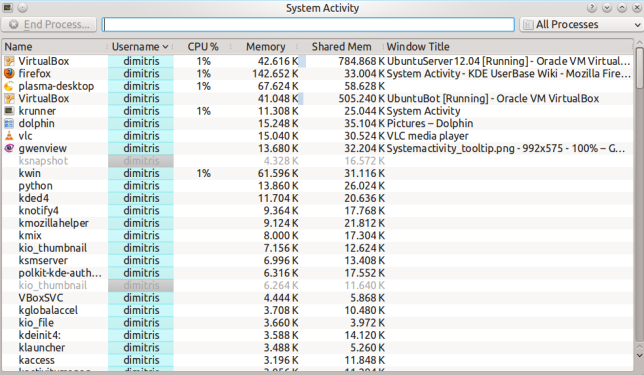System Activity: Difference between revisions
No edit summary |
No edit summary |
||
| Line 16: | Line 16: | ||
A system can be running unusually slow because a process (program) is demanding all of the computer's processing power (CPU usage) or is using all of the computer's memory. | A system can be running unusually slow because a process (program) is demanding all of the computer's processing power (CPU usage) or is using all of the computer's memory. | ||
By default, processes owned by the current user that are using a lot of CPU or memory are near the top. This means that any misbehaving programs should be near the top and easily visible. | |||
To end a process that is misbehaving, click on the process to select it and press the "Kill Process..." button. This will send a polite request to the program, asking it to close. | |||
If the process is misbehaving it may ignore your request to end, so we may need to force the program to end immediately. Doing this may result in any documents etc that the program had opened but not saved. To do this, right click on the process and chose "Send Signal" then choose "Kill (KILL)". | |||
[[Category:System]] | [[Category:System]] | ||
Revision as of 10:55, 10 January 2010
Template:I18n/Language Navigation Bar
Intro
System Activity is akin to the Microsoft Window's Task Manager, Apple's Mac OS X's Activity Monitor and Gnome's System Monitor. It pops up when you press the keyboard shortcut Ctrl+Esc or from the spanner (wrench) to the left in a KRunner (Alt-F2) window.
It shows a list of currently running processes, along with their CPU usage, Memory usage, and various other pieces of information.
General Tips
Almost every part of the UI has a tooltip to provide more detailed information, and WhatsThis functionality to explain what the information means.
Why is my system currently running slowly?
A system can be running unusually slow because a process (program) is demanding all of the computer's processing power (CPU usage) or is using all of the computer's memory.
By default, processes owned by the current user that are using a lot of CPU or memory are near the top. This means that any misbehaving programs should be near the top and easily visible.
To end a process that is misbehaving, click on the process to select it and press the "Kill Process..." button. This will send a polite request to the program, asking it to close.
If the process is misbehaving it may ignore your request to end, so we may need to force the program to end immediately. Doing this may result in any documents etc that the program had opened but not saved. To do this, right click on the process and chose "Send Signal" then choose "Kill (KILL)".

